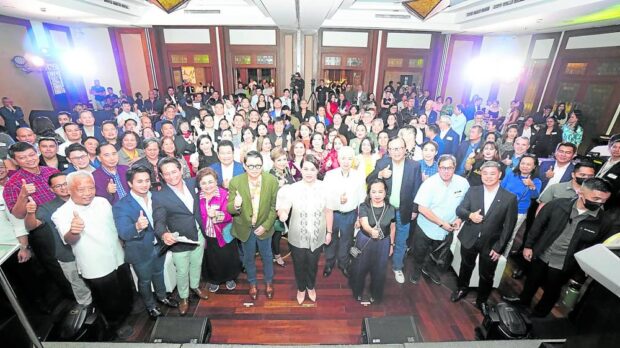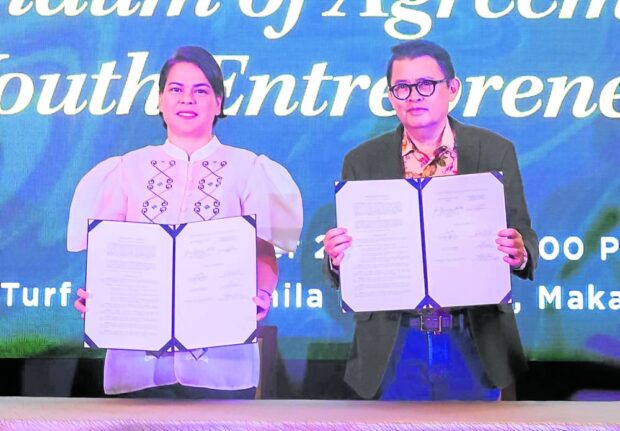
ALL GROWN UP Top government officials, business leaders and top entrepreneurs gathered to celebrate the 18th anniversary of Go Negosyo, an advocacy program to nurture a culture of entrepreneurship in the Philippines spearheaded by tycoon Joey Concepcion. —CONTRIBUTED PHOTOS
With the Philippines facing the possibility of a critical shortage in the number of farmers in the next decade, teaching today’s youth about the promise of agriculture entrepreneurship has become an imperative.
Go Negosyo, the advocacy arm of the Philippine Center for Entrepreneurship (PCE), has thus partnered with the Department of Education (DepEd) toward this goal, using the nonprofit organization’s reach and network to spread the gospel of entrepreneurship to the youth.
The partnership between Go Negosyo and the DepEd was sealed through a memorandum of agreement that was signed on Nov. 27 during the private sector-led organization’s 18th anniversary celebration in Makati City.
With this agreement, both parties have agreed to promote agriculture entrepreneurship among the Filipino youth through various programs and initiatives involving both the public and private sectors.
“Public-private partnership has had a lot to do with the success of Go Negosyo,” said Joey Concepcion, referring to the scores of success stories the organization had in the past when it comes to linking private sector experts and budding entrepreneurs.
The organization said it has organized the country’s biggest agriculture companies under its Kapatid Angat Lahat sa Agri Program initiative, the goal of which is to integrate small farmers into the value chain of the large agricultural companies.
This initiative links farmers directly with the private sector, thereby helping the country’s agriculture industry become more productive, profitable, sustainable and globally competitive.
‘Entrepreneurial mindset’
Go Negosyo said the programs outlined in the agreement with the DepEd aims to promote an entrepreneurial mindset among the youth of today by building skills through mentorship, increasing financial literacy, raising agricultural awareness, cultivating entrepreneurial skills in agriculture, and facilitating industry connections for mentorship.
These programs and initiatives include the school garden project called “Pampaaralang Taniman ng mga Agribida,” a public entrepreneurship mentoring event called “Youthpreneur,” and “Mentoring the Mentors,” which will train teachers in teaching basic entrepreneurship concepts in the classroom.
Last week, Go Negosyo held a pilot event of this Youthpreneur program, which attracted hundreds of senior high school students from 17 schools in the National Capital Region.
VITAL PARTNERSHIP Vice President and Department of Education Secretary Sara Duterte and Go Negosyo founder Joey Concepcion hold the signed Memorandum of Agreement promoting entrepreneurship and agriculture entrepreneurship among the Filipino youth through various programs and initiatives (top photo). The signing was held on Nov. 27 to coincide with Go Negosyo’s 18th Anniversary.
Concepcion said that the success of the pilot event of Youthpreneur bodes well for its future programs aimed at growing the next generation of Filipino entrepreneurs.
“We want to inspire a generation of agricultural leaders,” said Vice President Sarah Duterte, who is the concurrent education secretary.
“School gardens provide a platform for communities to come together, work toward a shared goal and promote healthy eating habits.” she said further.
Dwindling Filipino farmers
In the Philippine, a critical shortage of famers is seen in as little as the next 12 years without intervention from the government and the private sector.
In 2021, former Agriculture Secretary William Dar sounded the alarm, warning this will happen and threaten the southeast Asian country’s ability to feed its own growing population.
Citing the results of a 2020 study by retired University of the Philippines anthropology Professor Florencia Palis, Dar shared that the average age of Filipino farmers is 53 years old.
With the assumption of them retiring at 65, this means that they have only 12 productive years left, with many—if not most—unwilling to have their children take their place stemming from concerns that to become a farmer is financially unsound.
Palis’ paper titled “Aging Filipino Rice Farmers and Their Aspirations for Their Children” found that as many as 65 percent of the 923 farmers surveyed for the study believed that their children “would not have any future” tilling the land. INQ


